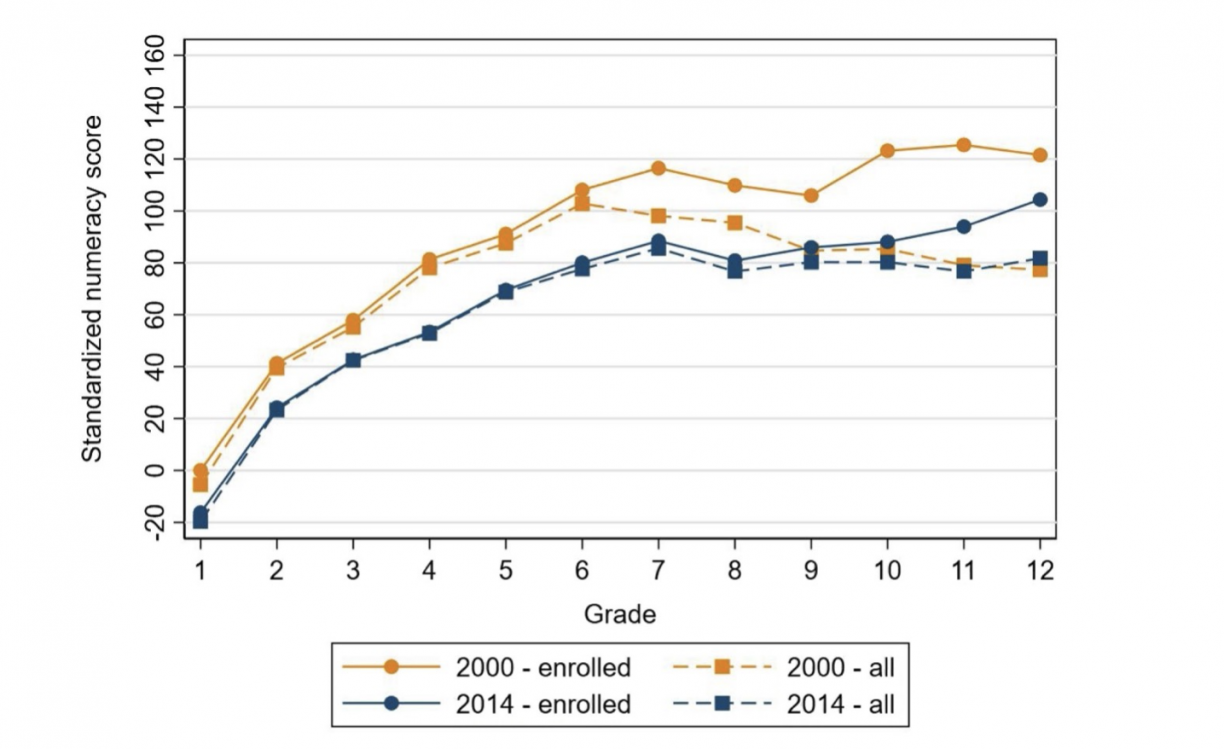Lillie Kilburn
Blavatnik School of Government, University of Oxford
Blog
In an International Journal of Educational Development (IJED) Special Issue, 12 papers (all open access) examine learning profiles and how they can be used to inform education system priorities to address the learning crisis.
Edited by Laura Savage of the UK’s Foreign, Commonwealth and Development Office (FCDO) and RISE’s Michelle Kaffenberger and Luis Crouch, Schooling without Learning: Implications of Learning Profiles for the Global Learning Crisis is an International Journal of Educational Development (IJED) Special Issue focused on using learning profiles to reveal the dynamics of learning behind the learning crisis.
Learning profiles visualise the skills, capabilities, or competencies children gain during their time in school. When learning profiles flatten early, as often occurs, this indicates that students are ceasing to rapidly gain new skills.

Source: Beatty et al., 2021
The 12 papers in the special issue reveal a need to prioritise mastery of foundational skills for all children in order to steepen learning profiles and ensure children continue learning and reach their full potential. They also point to the need for systemic change that ensures a high-quality education for all children.
In their overview of the special issue, the three editors identified five key implications of the work included in it:
While it seems natural to assume that more years of schooling will result in more learning, flat learning profiles show that this is not necessarily the case. Once learning trajectories have become flat, indicating that learning has stagnated, additional schooling has a limited effect on learning outcomes unless systemic improvements to learning are also implemented.
Read more:
It seems natural as well to think that achieving equal learning outcomes for all groups within a country (for example, all poor children reaching the same learning levels that rich children reach) would be the path to equity in education systems, but the papers find that this also is often not the case. Why? Because in many countries, even the highest-performing children are not reaching the level of learning they deserve. In fact, the papers find that focusing on reaching global targets for foundational skills has a greater equitable effect.
Read more:
Eliminating global learning poverty: The importance of equalities and equity
Looking beyond changes in averages in evaluating foundational learning: Some inequality measures
Building on the first two points, the papers find that girls’ schooling cannot be assumed to mean girls’ learning—but in fact literacy is powerfully beneficial to girls, and that is another reason why foundational skills are so crucial.
Read more:
Girls’ schooling and women’s literacy: schooling targets alone won’t reach learning goals
Aiming higher: Learning profiles and gender equality in 10 low- and middle-income countries
Effective investment in women's futures: Schooling with learning
Learning profiles are a unique tool because they track learning starting in the early years, while many assessments only measure learning at one point in time later in schooling. Early mastery of foundational skills is crucial because once children’s learning levels have fallen significantly behind the curriculum, it becomes nearly impossible to catch up. Furthermore, ensuring deep conceptual mastery is important as learning profiles reveal that current learning all too often is fragile, with learning progression frequently followed by stagnation or reversals as children have not sufficiently mastered the content.
Read more:
Schooling progress, learning reversal: Indonesia’s learning profiles between 2000 and 2014
New evidence on learning trajectories in a low-income setting
Many of the papers in the issue demonstrate that learning profiles can be constructed from a variety of learning data, including non-traditional sources of learning data. It’s essential to glean the most knowledge we can from the range of data that is available.
Read more:
Assessing the assessments: Taking stock of learning outcomes data in India
Average vs. distributional effects: Evidence from an experiment in Rwanda
RISE blog posts and podcasts reflect the views of the authors and do not necessarily represent the views of the organisation or our funders.